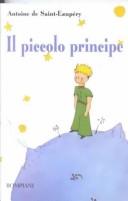valerie recenzis The little prince de Antoine de Saint-Exupéry
goddammit
4 steloj
how do you even write a book like this

Poŝlibro, 125 paĝoj
Lingvo: Italian
Eldonita je 22-a de aŭgusto 2002 de Distribooks Inc.
Le Petit Prince est une œuvre de langue française, la plus connue d'Antoine de Saint-Exupéry. Publié en 1943 à New York simultanément à sa traduction anglaise, c'est une œuvre poétique et philosophique sous l'apparence d'un conte pour enfants.
Traduit en quatre cent cinquante-sept langues et dialectes, Le Petit Prince est le deuxième ouvrage le plus traduit au monde après la Bible.
Le langage, simple et dépouillé, parce qu'il est destiné à être compris par des enfants, est en réalité pour le narrateur le véhicule privilégié d'une conception symbolique de la vie. Chaque chapitre relate une rencontre du petit prince qui laisse celui-ci perplexe, par rapport aux comportements absurdes des « grandes personnes ». Ces différentes rencontres peuvent être lues comme une allégorie.
Les aquarelles font partie du texte et participent à cette pureté du langage : dépouillement et profondeur sont les qualités maîtresses de l'œuvre.
On peut y lire une …
Le Petit Prince est une œuvre de langue française, la plus connue d'Antoine de Saint-Exupéry. Publié en 1943 à New York simultanément à sa traduction anglaise, c'est une œuvre poétique et philosophique sous l'apparence d'un conte pour enfants.
Traduit en quatre cent cinquante-sept langues et dialectes, Le Petit Prince est le deuxième ouvrage le plus traduit au monde après la Bible.
Le langage, simple et dépouillé, parce qu'il est destiné à être compris par des enfants, est en réalité pour le narrateur le véhicule privilégié d'une conception symbolique de la vie. Chaque chapitre relate une rencontre du petit prince qui laisse celui-ci perplexe, par rapport aux comportements absurdes des « grandes personnes ». Ces différentes rencontres peuvent être lues comme une allégorie.
Les aquarelles font partie du texte et participent à cette pureté du langage : dépouillement et profondeur sont les qualités maîtresses de l'œuvre.
On peut y lire une invitation de l'auteur à retrouver l'enfant en soi, car « toutes les grandes personnes ont d'abord été des enfants. (Mais peu d'entre elles s'en souviennent.) ». L'ouvrage est dédié à Léon Werth, mais « quand il était petit garçon ».
(Wikipedia)
how do you even write a book like this
I'm proud to have finished Le Petit Prince because it is the first book I have read entirely in French since my A Level exams over twenty years ago! Admittedly this is a children's book and it took me the best part of two weeks, but it's an encouraging start!
I hadn't read this story before so wasn't prepared for how surreal it is. On one hand this was great for me because I thought it an entertaining tale and Saint-Exupery's imaginative details frequently had me laughing out loud. It's vitally important to keep your volcanoes well swept! On the other hand though, bizarre plot ideas often had me doubting my translation skills. I was sure 'Dessine-moi un mouton' meant 'draw me a sheep' but that made no sense. Nonsensical however is what Le Petit Prince is all about so sheep were indeed drawn!
Saint-Exupery veers from surreal to overly-sentimental …
I'm proud to have finished Le Petit Prince because it is the first book I have read entirely in French since my A Level exams over twenty years ago! Admittedly this is a children's book and it took me the best part of two weeks, but it's an encouraging start!
I hadn't read this story before so wasn't prepared for how surreal it is. On one hand this was great for me because I thought it an entertaining tale and Saint-Exupery's imaginative details frequently had me laughing out loud. It's vitally important to keep your volcanoes well swept! On the other hand though, bizarre plot ideas often had me doubting my translation skills. I was sure 'Dessine-moi un mouton' meant 'draw me a sheep' but that made no sense. Nonsensical however is what Le Petit Prince is all about so sheep were indeed drawn!
Saint-Exupery veers from surreal to overly-sentimental and is often repetitive. Had I read the story through just in English, I probably would have been irritated by this, but for language study purposes it was useful to have new words reoccurring in later pages. Whether I will ever again need the words for someone who lights streetlamps or a man who manually changes railway points is another matter. The French did often seem overly flowery and I notice Arvel's translation sometimes paraphrases to simplify this. Overall I enjoyed this book and it is a fun tale, albeit a completely mad one!